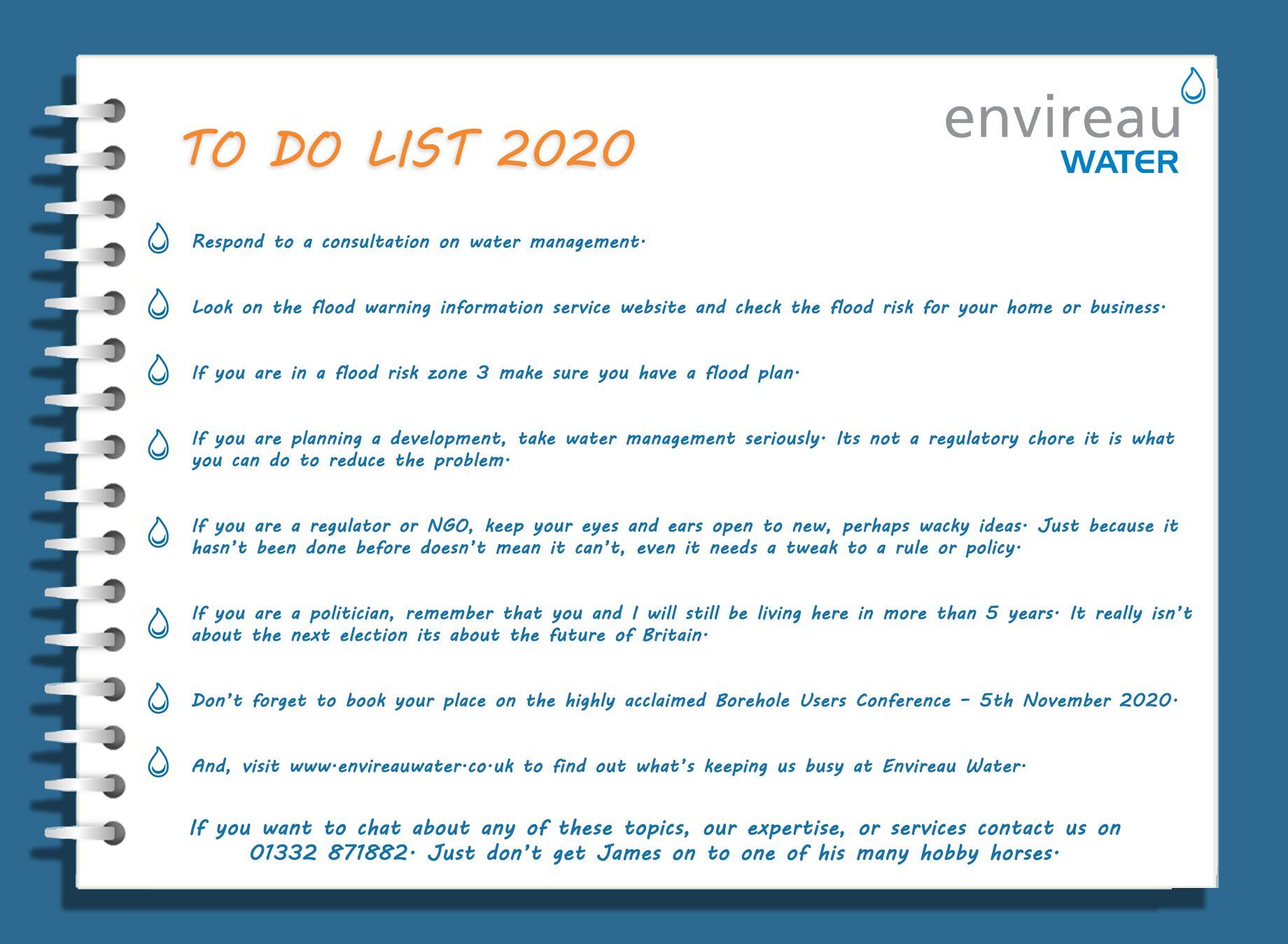A Big Welcome to 2020
What's in store for us this year?

I’ve forgotten how many of these missives that I’ve written, but I’m pretty confident that my predictions, while being mildly amusing (to me anyway), have been hopelessly wrong! Last year was no different. Here’s a reminder:
“I’ve deliberately avoided the B word, which will without a doubt dominate 2019. However I, like government, have no idea what is going to happen. The weather is easier to predict. After last year’s extremes, an average year I think. But with average rain we may not get aquifers topped up until a wet autumn kicks in. No summer scorcher, but some warmth in late spring/early summer. We’ll be dancing around the D word. Steady rain will keep plants growing, but without high rainfall months, reservoirs will be slow to fill. Normal temperatures will keep a lid on demand.”
OK, I was right about the B word, but I don’t think I should claim a great success there. As for an average year, the rainfall totals for the year aren’t in as I write this but I’d be surprised if even at a national level, annual rainfall was at or about average. Once again, we went from a dry late winter and spring, to an extremely wet autumn and winter. I might claim being about right the summer scorcher, but my family and I did get a wonderfully hot fortnight in North Devon at the end of July. The word drought was hot on the lips of the water resources world. I sat in several meetings relating to water and the food supply industry, and there were some very stressed Environment Agency staff, all the way through to September and in some cases beyond. Below average rainfall over the 2018-2019 recharge period after the heavy abstraction in 2018 left lowland groundwater fed catchments in a very stressed state.
Interestingly this was the exact opposite situation from 2018 when groundwater fed catchments fared very well with low permeability catchments being particularly stressed. Chalk and other sensitive catchments responded as they would with winterbourne streams receding well down catchments. Then it started raining. And raining and raining. Reservoirs filled rapidly and in some cases too rapidly, as serious flooding became the single biggest issue.
I’ve spoken about these swings in the last previous two missives and I think this demonstrates what the vast majority of right minded scientists are saying, the weather is getting more variable with the swings getting more extreme. This is definitely weather change, and is definitely what the core of climate change predictions suggest would happen.
I’m not going to talk about climate change, what causes it and what needs to be done. That’s too big a subject. What I do want to talk about is the variable weather and what we need and can do about that. Firstly, everyone needs to recognise that the variable weather, from drought to floods, affects everyone – it does not just affect the people that are shown on the telly. It affects people on a personal level, it affects the food that we grow and eat, it affects the environment we live in.
Flooding in particular is currently top of the water management agenda. Individuals and businesses across the country from the Somerset Levels to the Yorkshire Dales have been devasted by flooding this year. While there isn’t much we can do about the rain falling from the sky, there is plenty we can do about what happens when it hits the ground.
Solutions to surface water management and flood prevention or control are multifaceted. They operate at different scales and are affected by many factors that are controlled by different stakeholders and managed by a whole smorgasbord of regulators and NGOs. It is absolutely essential that a wide range of stakeholders engage but it is also essential that their is one unifying body that can approach solution selection and implementation based on sound scientific and engineering principals and that the right solutions are applied at the right scale. Water has to be managed on a catchment basis. The catchment is the fundamental basic starting point of any water management problem. Managing water on political or other social geographic boundary basis is quite frankly stupid.
So, some ideas for forward thinking water management. Firstly, in a very variable weather pattern or even a changing climate where we swing between lots or not much water, we need a flexible regulatory approach. We need to be able to store water when there’s plenty and use that water when there isn’t. We need regulators to be able to make rapid decisions, to be able to change their minds and to recognise that a decision today, doesn’t mean a decision for ever. Where necessary the rules that they work within from primary legislation all the way down to local attitudes, need to reflect that flexibility.
Secondly, we need a national, catchment based authority which is responsible for water management. Both protecting us from flooding and managing the water we have so that it is available for people to drink and use. This isn’t what the Environment Agency, NRW or SEPA does, or not in a consistent joined up way. The linking of land drainage, water resources development and flood management are all part of the same circle and need to be managed by a single body. When we know how much, where and when we have it, then a licensing or permitting authority can let people access and use it in a sustainable way. That single body must not be a private company, a charity or a trust.
Envireau Water have been using this approach for over 20 years. Balancing the scientific need, with an engineering approach to satisfy regulators and solve problems is what we do across the technical disciplines and sectors we work in. Whether it is undertaking a flood risk assessment or applying for an abstraction licence, the issue is always where is the water coming from, where is it going to, and how do we interact with it on the way. The permits are the easy bit, balancing the circle is the trick.
PREDICTION FOR 2020
‘Really, again?’ our Dr Ham said to me. ‘Well yes’ I said, ‘my fan expects it’. Spring will start to dry things out, Summer storms will set us back again, an average Autumn will set us up for gales in early Winter, and sledges will be out when I’m writing this next year.
On a more serious note, 2020 is the start of a new decade. Like it or not we are entering a new political arena. There is a lot to play for and politicians and policy makers have lots of promises to keep. We need to stand up and be heard. We need to contribute ideas and comment when they are asked for, and more importantly when they are not. We are all part of the solution to water management challenges and 2020 is the year that you need to wake up to that.
To finish, I would like to take this opportunity to wish you and yours all the very best for 2020 and whatever it brings, that you enter 2021 in a better place than you leave 2019.
JAMES DODDS
January 2020









